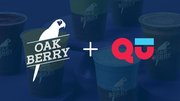Operations
Restaurant catering: Comprehensive vs non-comprehensive solutions
Erle Dardick discusses what makes for a comprehensive vs non-comprehensive catering solution.

November 14, 2024 by Terry Matthews — Managing Partner, Off Premises Growth Academy
Over the past few months, I've been lucky to engage with many of the restaurant catering industry's thought leaders. Some of these conversations took place on my podcast, the Catering Cage, and others on phone calls and Zoom meetings. Having these kinds of real discussions has always been one of my favorite parts of what I do. That's what this whole project is about, in a way, furthering the catering conversation to help restaurants do more catering. That's the idea.
When I started jumping back into the weeds of this restaurant catering thing, I was a little worried. What if people just didn't want to listen? What if, in my brief absence, the conversation had evolved past the point of recognition? Getting companies into the conversation and understanding the topic has been a battle I've been fighting most of my career. What I've found since my return to the field is that people are more ready than ever to not only listen but implement the core strategies and fundamentals that make for a solid restaurant catering framework.
Comprehensive vs non-comprehensive catering solution
With that being said, I think it's become more important than ever to begin framing the conversation and language that will underlay the advancement of restaurant catering programs everywhere. Recently, I've been having discussions about what makes for a comprehensive vs non-comprehensive catering solution. Whenever this topic comes up, I often see people bandying about one feature or another. CRM? We have that! Customer loyalty programs? Sure, got it! The truth is features do not make function. It's not that certain features aren't essential, they are, it's just that features need to be intelligently designed around restaurant catering operations. A feature-complete solution is not per se a comprehensive solution. When thinking about what catering solutions are correct for you, the first thing that should come to mind is workflow. A comprehensive solution is about getting the right data in the right hands at the right time.
Catering out of restaurants is an operations-based problem. Anyone can take an order, the challenge is to execute it perfectly every time. This means designing your operations around best practices and the gold standards, as defined by our industry leaders.
The problem that restaurants often have is that POS dependency is very real. To give a bit of context the online ordering companies were looking at a world where POS was the only thing out there in the early years of market adoption, so they began to iterate on top of it. The truth is that many of these companies are now legacy companies. This isn't a bad thing; many of the online ordering companies are incredibly active in the restaurant catering conversation looking for how they can improve. I've been talking with a lot of these organizations behind the scenes and not only are they excited about future potential, most are also willing to make changes to their strategy to best support restaurant operators They are marching towards a future where their technology will cross over into restaurant catering operations. But they need guidance and lots of it. After all, building backend solutions for the B2B transaction takes both time and expertise.
While I've been talking to a lot of the big and established technology companies some of the most exciting conversations I've had are with smaller and very innovative technology companies. I've got to say the understanding that has been expressed by a few of the up-and-comers has floored me. They are saying much of the same stuff that I've been trying to hammer home for almost 28 years. They've got some things figured out that everybody else is struggling with. My guess is that a few of those legacy companies might just start to make some very smart acquisitions, and when that happens oh boy.
'More comprehensive' does not always mean 'better'
Something that I need to point out is that more comprehensive does not mean better. It means more comprehensive. These solutions, while awesome, are by their nature much more intensive to implement. In part, this is a stage of development and strategic focus decision. Just because one solution can support a fully developed restaurant catering program at a large scale and another one would struggle in that same position, does not mean that one solution is always correct over the other. Less comprehensive and lighter solutions do have their place.
You need to understand where the restaurant catering channel begins and ends for you based on your people, systems, infrastructure, level of desired investment, and your customer's expectations. These are the things that you need to analyze to figure out the right catering solutions for you.
And here's the crux of the issue, you have to be involved in the conversation if you want to grow your catering sales. It's not enough to watch passively, because your company's immediate needs are always unique.
I'm so happy with the community building that happened at the Restaurant Catering Workshop, Oct. 15-16 in Denver and can't wait to do it next year in Austin. It was a fantastic opportunity for the necessary conversation to help restaurant operators and restaurant software companies continue to grow and thrive in catering. There was so much passion and love in the room and it was amazing to see. I encourage everyone reading this to start thinking about how they can get further involved in the discourse that will help drive the industry forward.
I'm looking forward to continuing to bring new and interesting people into this awesome conversation that's developing. So if you're ready to take control of your restaurant's catering future, let's talk catering.
About Terry Matthews
Erle Dardick is an entrepreneur, author, and off-premises thought leader in the global foodservice industry. His mission is to help operators create successful off-premises revenue channels. He turned a small Vancouver deli into a flourishing operation and developed MONKEY, the leading cloud platform for takeout, delivery, and catering. He founded The Catering Institute, MonkeyMedia Software, and Off Premises Insights. Now, he leads The Off Premises Growth Academy, advocating for the industry and providing training. Erle holds an MBA from Simon Fraser University and lives in Vancouver, BC.












